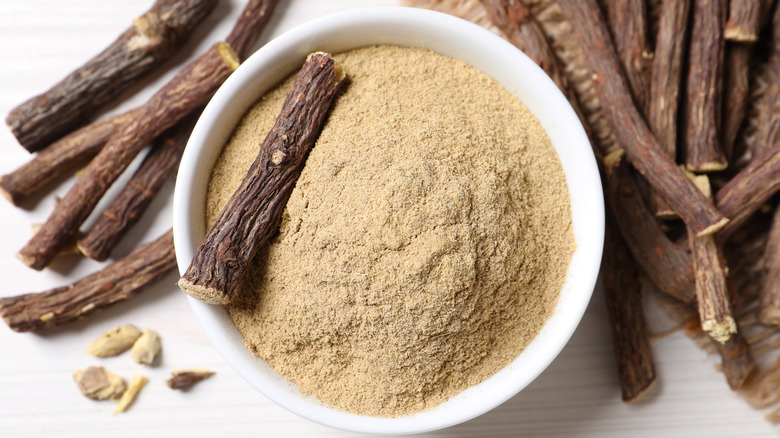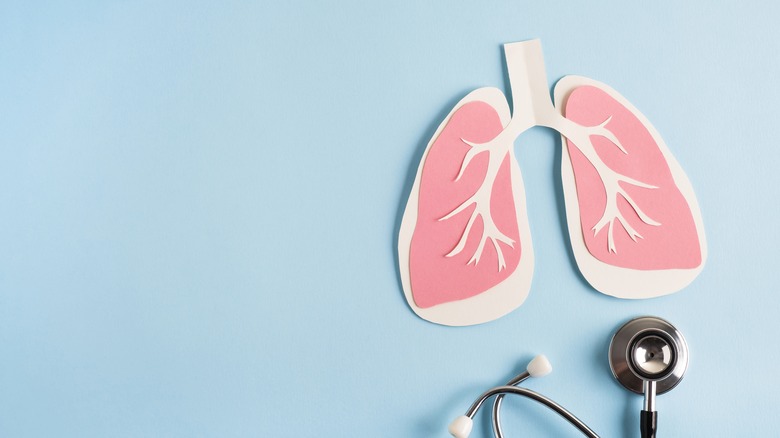Health Benefits Of Licorice Root
Let's talk licorice. No, we don't mean the strawberry-flavored Twizzlers you would gnaw on at the drive-in when your parents took you on family vacations to the beach. And we certainly don't mean those candy-coated forms of black licorice your grandma used to eat in front of the TV.
For most in modern society, the word licorice probably doesn't conjure up images of leafy green plants and twig-like roots. But for millennia, humans have known licorice as a magical healing root that could cure a multitude of ailments. Toms reports that the first record of licorice root being used for its medicinal properties dates back to 2300 BC when Chinese Emperor Shennong had it penned as a plant that could rejuvenate aging men. Since then it has been widely recorded as a common ingredient used in remedies of all sorts coming out of Ancient Egypt, Ancient Greece, and more. Licorice is still commonly used today amongst practitioners of herbal medicine for its wide range of medicinal properties. Let's take a closer look.
Licorice for respiratory problems
A 2020 review published in Textbook of Natural Medicine notes that licorice root has historically been used as a demulcent — a substance that alleviates irritation of the body's mucous membranes. For that reason, people have long believed that tea made with licorice root may be useful for treating dry coughs (per Verywell Health). It is also believed that licorice root may be a great option for clearing up a scratchy or sore throat. A 2019 study published in Biomedicines supports the use of licorice tea for the throat, reporting that it may even help treat symptoms of strep throat.
Additionally, animal studies suggest that glycyrrhizin extract from licorice root may help relieve symptoms of asthma, particularly when used in conjunction with modern asthma treatments (per Healthline). However, more research is needed before we can draw any conclusions regarding the effects of licorice root on humans with asthma.
Licorice, acid reflux, and the stomach
While Red Vines might not be great for your gut health, licorice root just might be! Harvard Health Publishing reports that licorice can increase the amount of mucus that lines the esophagus, protecting it from the irritation that can come with acid reflux. A 2011 study published in Evidence-Based Complementary and Alternative Medicine adds another layer to the conversation, finding that over a period of 30 days, adults with indigestion and heartburn reported significant improvement compared to placebo after being treated with licorice capsules.
Licorice root has also shown promise when it comes to treating peptic ulcers – unpleasant sores that can form throughout the stomach, esophagus, and small intestine (per Healthline). A 2015 study published in the Iranian Journal of Pharmaceutical Research found that when mice were administered licorice root extract, it worked better in treating ulcers than did omeprazole, a medication commonly used for this purpose. However, more research is needed to determine whether or not these results are also applicable to humans.
Licorice might be helpful for constipation
You are probably quite ready for us to stop using the word mucus, but sorry, we're not done. Because look! It applies here as well. The large intestine produces mucus so that stool can slide easily through it (per Cleveland Clinic). If there isn't enough of it and the lining is dryer, it can lead to constipation. Medical News Today reports that people with chronic stress often suffer from dry constipation.
While licorice is not a laxative, consuming the herb may help heal injured mucous membranes in the digestive tract (per Kaiser Permanente). This might aid in relieving constipation, so if you are having trouble going to the bathroom, you may want to consider trying a cup of licorice tea after a meal to soothe the digestive tract and get things moving (per Medical News Today). However, if you find yourself reliant on tea to use the bathroom, be sure to consult your doctor to get to the root of the problem.
Licorice for menopause and menstrual symptoms
Women of all ages may be happy to learn that licorice has shown promise in treating some of the harsh symptoms of menstruation and menopause. In a 2019 study published in the Iranian Journal of Pharmaceutical Research, it was found that licorice lessened the severity of menstrual cramps to nearly the same degree as ibuprofen, although the researchers conceded that larger studies are needed.
An earlier study published in the same journal found that when menopausal women suffering from hot flashes were given a daily dose of licorice root, they found longer and more prominent relief from their symptoms than did those who were given a placebo. It was also noted that the women who reported feeling relief noticed their symptoms returned after they stopped receiving treatment. A study published in the scientific journal Steroids reports that this may be because during menopause, estrogen levels drop, and licorice root might increase estrogenic activity.
Contraindications of licorice
While licorice root might do a world of good for a lot of people, it's just not for everybody. Healthline notes that pregnant women should avoid licorice supplements and limit their intake of food and drink containing licorice as it could have an effect on the baby's brain development. Due to scarcity of research, children and breastfeeding mothers should also steer clear.
Healthline warns that licorice may have adverse interactions with drugs like blood thinners, blood pressure medicine, cholesterol-lowering medicine, diuretics, estrogen-based contraception, and nonsteroidal anti-inflammatory drugs (NSAIDs). So as always, consult your doctor before brewing your tea.
The U.S. Food and Drug Administration (FDA) notes that although rare, it is possible to overdose on licorice — and that incidentally, most overdoses are due to too many licorice-laden sweets! While it may seem silly, excessive licorice use can result in hypertension, lowered potassium levels, lethargy, and congestive heart failure.
The FDA suggests contacting your doctor if you have been consuming a lot of licorice and start to develop muscle weakness or an irregular heart rhythm. The National Center for Complementary and Integrative Health stresses that people with cardiovascular or kidney problems are particularly vulnerable to negative side effects from licorice.






